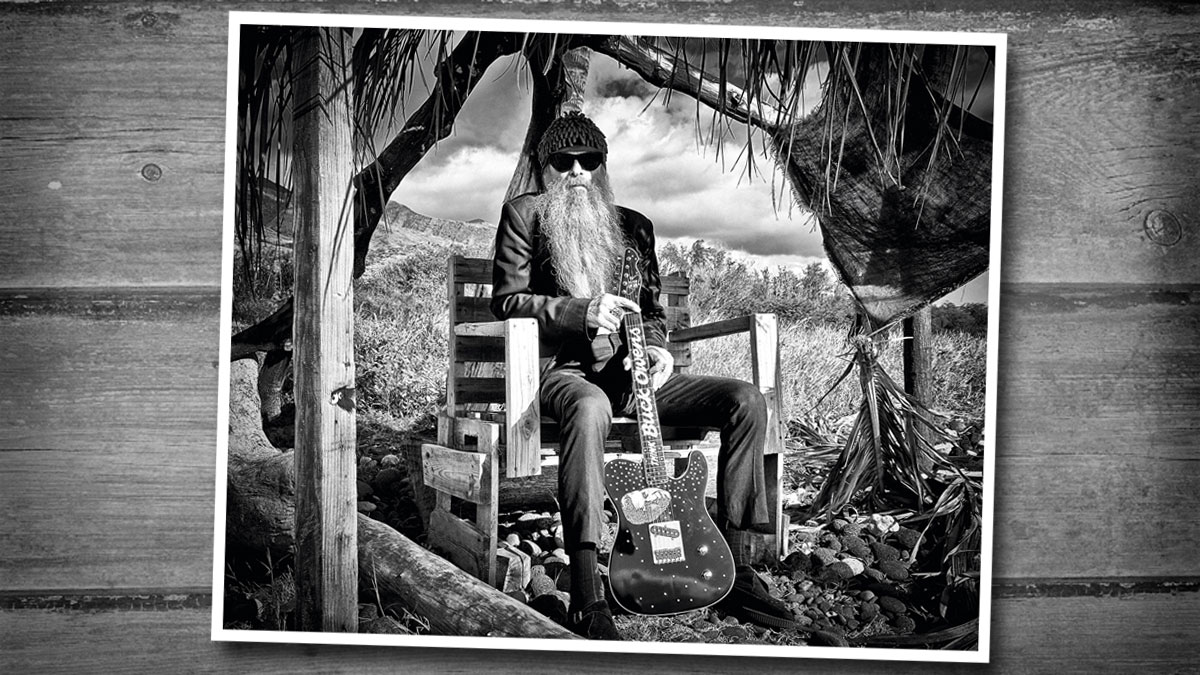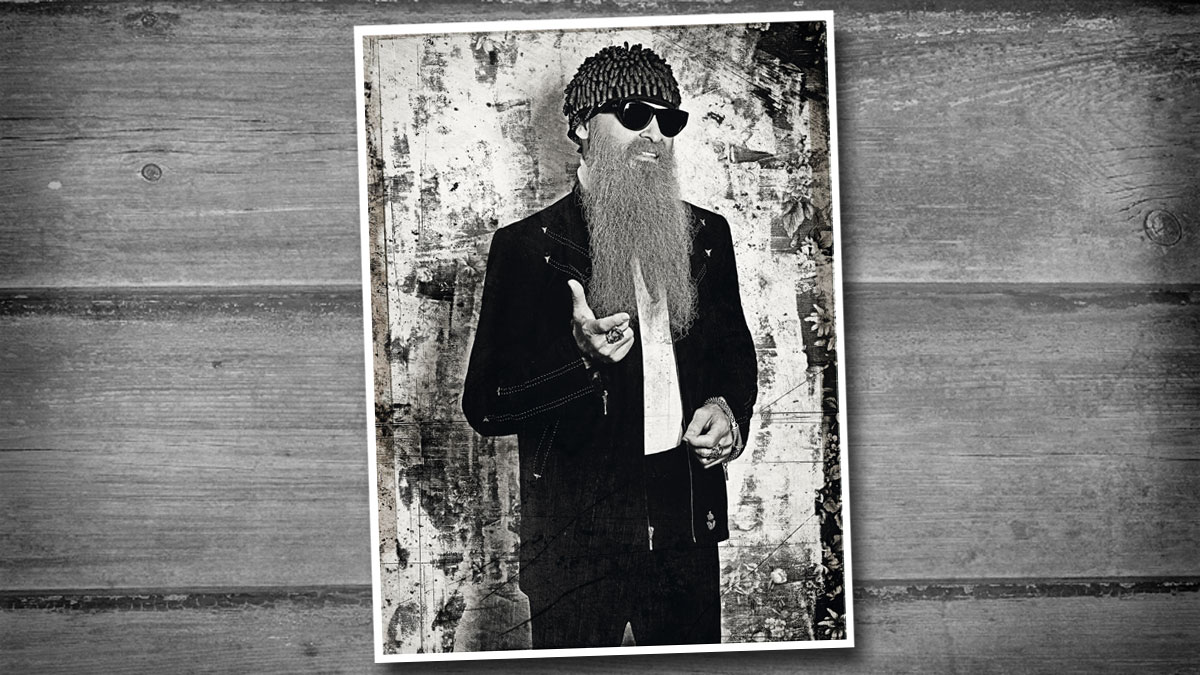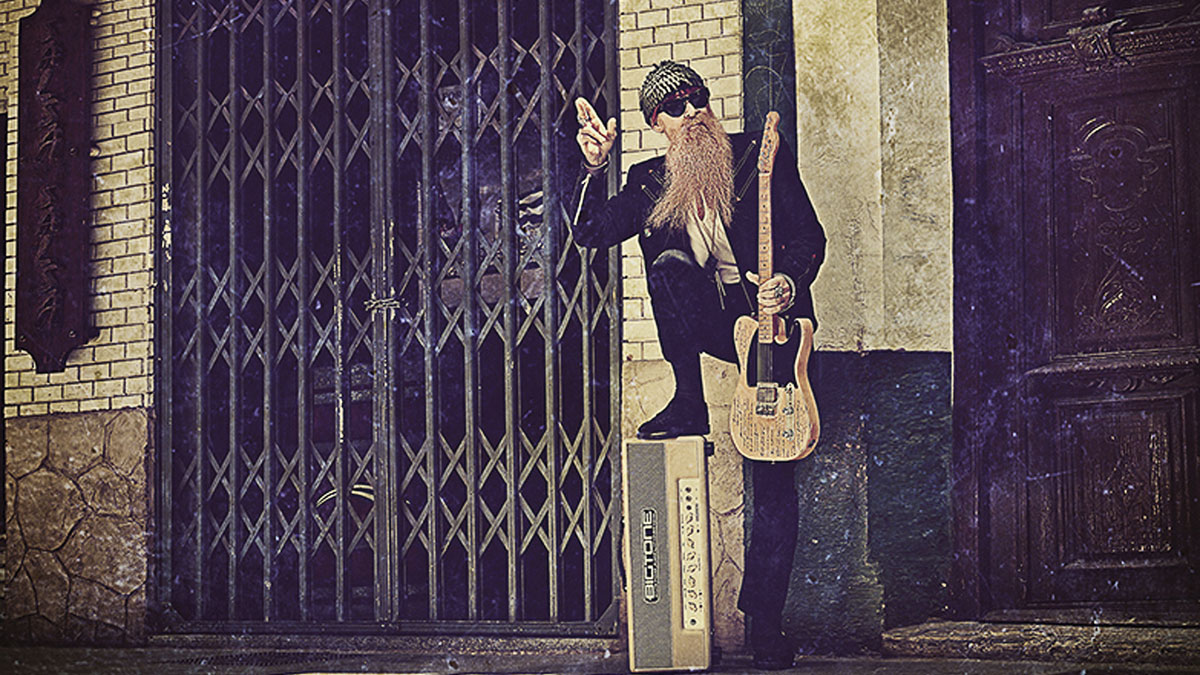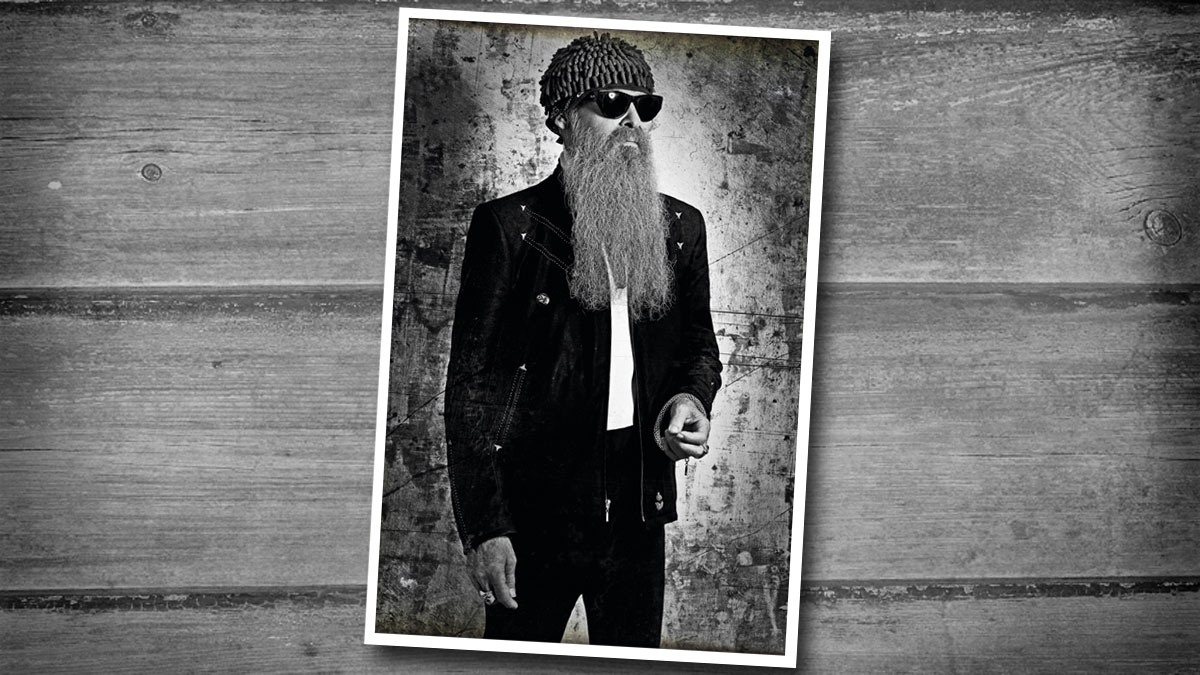Billy Gibbons talks BB King and new album Perfectamundo
The Texan six-string slinger on his Cuban adventure

Introduction
He’s no stranger to testing the boundaries of blues-rock, as 1983’s glossy, synth-laden Eliminator attests. Now, ZZ Top’s main man has fallen under the spell of Cuban music on his debut solo outing, Perfectamundo…
ZZ Top are in a jam. The outdoor gig they were due to play in Boise, Idaho has been blown out by flash floods, and to make matters worse, they’re unable to collect a haul of custom-made quirky guitars that are waiting for them at the workshop of John Bolin in Boise.
The idea of Reverend Billy Gibbons going all Latino on Perfectamundo with his solo project Billy Gibbons And The BFG’s is a strange one
“We’ve got busloads of instruments needing his attention, a load of junk, with all the good new stuff at his shop,” Billy Gibbons’ familiar sand-blasted voice drawls down the line.
“But the good news is that it shaved off several hours of driving time, and now we’ve got a sunny day off here in Telluride [Colorado]. It’s a great gig in an old mining town situated between two dramatic, sharp canyon sides. The stage is at the far end so the music has only one place to go: it can’t go left or right, [there are] just two solid walls of mountain.”
The idea of Sharp Dressed Man scaring the heck out of the mountain lions is certainly an intriguing one. Since they boogied their way out of Houston in the early 70s, ZZ Top and their infectious brand of barrelhouse rock - the whole shebang anchored by Billy Gibbons’ growling guitar, the skin-tight drumming of Frank Beard and Dusty Hill’s jawbone-shaking bass - have been unstoppable.
Chewing up punk-rock in their slipstream, even the synthesizers and the depraved delights of digital recording employed on their 1983 album Eliminator failed to dent the visceral gut-bucket raunch that’s always been the band’s trademark.
So, at first sight, the idea of Reverend Billy Gibbons going all Latino on Perfectamundo with his solo project Billy Gibbons And The BFG’s is a strange one. But from the first notes of the album’s opening track, Got Love If You Want It, with Billy’s guitar ringing out over a greasy Afro-Cuban rhythm, it’s clear that ZZ Top fans have nothing to fear.

The taste of Stella
What initially drew you towards playing the guitar?
“I’m self taught, and didn’t have the patience for proper lessons. But I was talking this whole thing over with Dusty recently. He said, ‘I knew that I wanted to do this, be playing something early on.’
“I said, ‘Yeah man, I knew the same thing.’ My mom took my sister and I to see Elvis Presley when I was five years old and I can remember it like it was yesterday. I just knew: ‘I wanna do that!’
We would make up a list of all these tunes, and beg our mom to get these records when she went shopping
“Then on Christmas Eve 1963, Santa stopped by with a sack and left me a Gibson Melody Maker and a Fender Champ. From that point on, while the other kids on the block were trying to learn to play The Beatles, I was working out Jimmy Reed and Muddy Waters licks.”
In 1988, you donated ‘Muddywood’ - a guitar you’d had made from a piece of Muddy Waters’ house - to the Delta Blues Museum in Clarksdale. Has the blues always been the bedrock of your music?
“Without question, but I was drawn to the music not knowing what you call it; when you’re a youngster you just like what you like. We had a housekeeper, big Stella, and she loved the radio, and she’d have that radio blasting on the blues channel all day long.
“My younger sister and I would ask, ‘Stella, what is that ?’, and she’d say it was Jimmy Reed or Muddy Waters. We would make up a list of all these tunes, and beg our mom to get these records when she went shopping. But the list was not from our hand, it was straight from Stella; she’d tell us what to order up!
Till this day, I still talk to people who think The Rolling Stones wrote Little Red Rooster
“That was the inspiration, the cornerstone. We never had to look back. [Blues is] such a great art form. But thank goodness for you Brits! The art form was running the risk of vanishing forever, and if it had not been for so many of the great British acts embracing the blues, it would have become just another throwaway music over here. Till this day, I still talk to people who think The Rolling Stones wrote Little Red Rooster, and The Beatles wrote Roll Over Beethoven.”
Growing up in Houston, you must have run across Lightning Hopkins?
“Yeah, I used to see him all the time, and although I didn’t know them back then, Frank and Dusty backed him upon many occasions. Back in the 60s I had my band, The Moving Sidewalks, and Frank and Dusty were playing in a band that was called The American Blues who were based in Dallas, Texas.
“Funny thing was that although we played in Houston and they played in Dallas, we never saw each other perform except on television. They had a Saturday television dance show, and that was the only time they saw me and the only time I saw them!”

Jiving with the King
You got to play on the BB King & Friends album, brought out to celebrate BB King’s 80th birthday. When did you first meet?
“My dad being an entertainer, it wasn’t uncommon for me to tag along with him when he’d make the rounds, and one of those afternoon stops would often be a recording studio. There were two proper studios in Houston back then, ACA and Gold Star, and because his band was from Houston, BB King was recording there. I remember going into the studio, and although I didn’t know who BB King was, I was dazzled by the whole thing, just seeing a real loud band, playing this great music.
I saw BB record the song [Tired Of Your Jive] when I was seven years old, and of course told BB when we met up
“I had the great pleasure of being invited to perform on that tribute album when BB King was turning 80. On the way over to the studio, I was asking this buddy of mine if he knew what BB wanted to record, and he said, ‘Well, I think he wants to record this song he did way back in the 50s called Tired Of Your Jive.’
“I smiled and he said, ‘You seem fairly confident with that.’ I told him I saw BB record the song when I was seven years old, and of course told BB when we met up. Naturally, he didn’t have any recollection of it, but said, ‘You were actually there?’
“I said, ‘Yeah, I was just a little boy there with my dad.’ So he said, ‘Okay, you shouldn’t have any trouble with it! Are you plugged up?’ I said, ‘Yeah, I’m in tune and ready to go.’ And so he told me to go over by the vocal booth. I asked him what I was going to do there, and he said, ‘You’re going to sing, the words are there for you.’ I said, ‘But BB - I’m white…’
“He was a wonderful guy and if you ever get the chance, check out a piece of video on YouTube under the title of ‘Billy Gibbons and BB King’. He came through town last year - the band had just come off the road, and a pal of mine said he’d take me along. Little did I know he’d taken a guitar along and I ended up on stage.
We had no real intention of making an album of Cuban-inspired music, it was just an experiment to see if we could
“There’s a good 15-minute clip of BB and I swapping stories. The band was just loping along quietly behind us, and I told this same story. The good news is that he really did leave a glorious legacy behind, and if you want to turn that blue to happy, just put on a good BB number and you’ll be dancing!’”
You’ve got an intriguing bunch of musicians on Perfectamundo, including Cuban singer Chino Pons and Argentinian keyboardist Martin Guigui. How did the project come about?
“We had no real intention of making an album of Cuban-inspired music, it was just an experiment to see if we could do it, and to legitimise my trip to Cuba. I’d been invited to play the Havana Jazz Festival, but I’m the furthest thing from a jazz guitarist. How the heck did my name get on a jazz roster of all things?
“I didn’t want to pass up a trip to Cuba, so I thought we’d better get something done quick because I didn’t want to crash a jazz party with a whole bunch of rock ’n’ roll. That’s what started it.”

Cuban blues
Did you have any particular guitars in mind when you began recording?
“I grabbed the first thing within arm’s reach, which was my ‘go-to’ Les Paul, but then I tried a Fender because I knew if I used the Les Paul, I’d come out with the same blues stuff. Then, because I’ve been a fan of the lowly Fender Esquire forever, I suggested I should try using one in the hope that it would change things around a little. But they said, ‘No, it’s still sounds too bluesy.’
“So I ended up playing a 1961 SG Les Paul, that I bought from a lady in Hawaii who was a lounge player. When I got hold of it, the thing was mint! 1961 was the first year they changed the body shape into what later became the SG, but at the time they were still calling it Les Paul.
We used two amps, a 1966 18-watt Marshall and one of the new Magnatone reissue combos
“My problem was that much as I wanted to break out of this blues-based block, I found I couldn’t - but the blues figures sounded good within the Cubano rhythmic backbeat. So, although I’m not Cuban and can barely speak Spanish, the album does seem to work. A couple of my buddies who are from Cuba sprinkled holy water on it, and said, ‘Don’t change a thing, man. Sounds pretty good.’”
There are some really thick guitar tones on Perfectamundo. How did you come up with the sound?
“We used two amps, a 1966 18-watt Marshall and one of the new Magnatone reissue combos. The Marshall is very rare, because it has two 12s instead of the two 10s that they normally used.
“It has the original Celestion speakers, but they carry a sticker that must have been put on before the company had changed the name to Celestion, saying Silverdale Road, which was apparently where the factory was located. It’s a really robust amp.
“With the Magnatone reissue, they resurrected the mighty name, took it one step better, improved the sound, and even included that Magnatone wobbly vibrato. The sound is killer and it’s still got all the personality the original amps had.
“We set the amps up on opposite sides of the room, mic’d them up, panned one to the far left and the other to the far right, creating this very thick sound. The end result was quite pleasing, and I’m really happy with the way it worked out.”
Finally, it’s over 20 years since your groundbreaking approaches on Eliminator. How do you feel about it now?
We were out-of-control crazies in the studio, twisting knobs and grabbing things to see what they would do
“We were out-of-control crazies in the studio, twisting knobs and grabbing things to see what they would do. That turn of events left all of us in a state of shambles. Now you’ve got these nostalgic rigs that demand everything be recorded on analogue tape, and people stand around waving the purist flag. But after Eliminator we were left on the side of the tracks, total wrecks, saying, ‘Wow. What do we do now?’
“Fortunately, if you choose to live in the digital world, sometimes it’s about the appeal and sometimes it’s about economics. It’s less expensive and sometimes it’s all the studio has to offer.
“Analogue has enjoyed this robust revitalisation, but we still use both - there’s no hard-set rule we can think of. You can argue all you like, but who wants to wait 30 minutes while a big heavy roll of tape comes to a stop, and then you have to rewind? By the time that tape stops, you’ve lost the moment.”
Billy Gibbons & The BFG’s’ new album, Perfectamundo, is out now on Concorde Records

